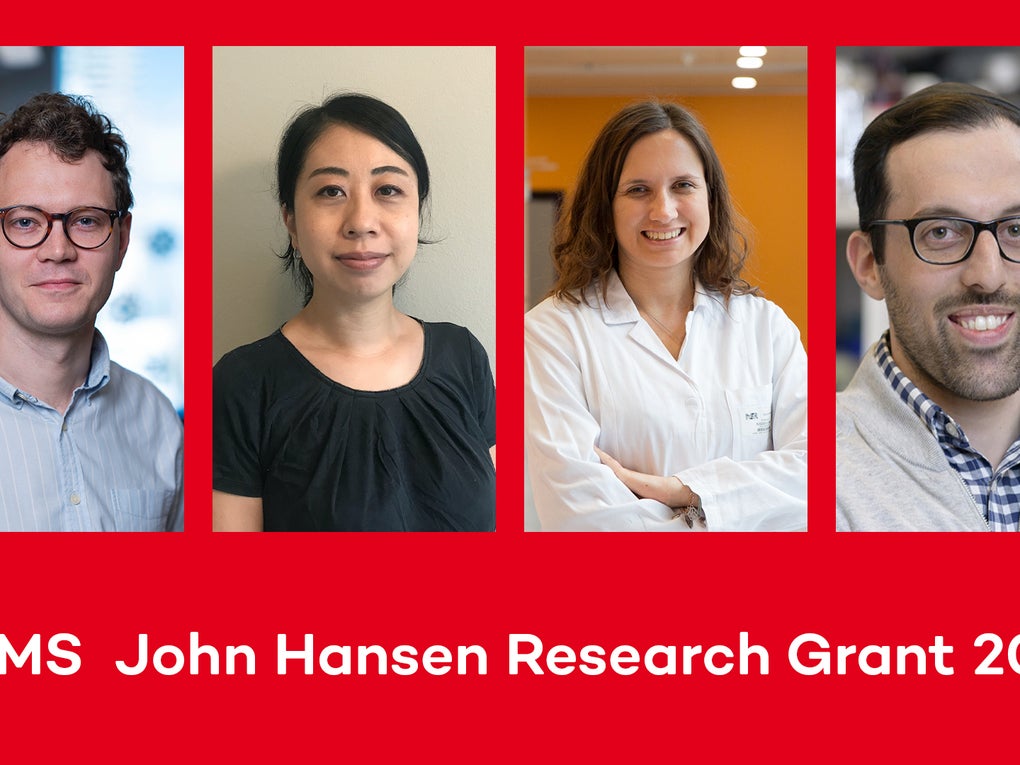
Blood cancer research funded to give patients hope
Tuebingen, May 25, 2023
DKMS Stiftung Leben Spenden awards four outstanding young scientists with the highly endowed DKMS John Hansen Research Grant:
Ivan Cohen, PhD, University of Pennsylvania
Eiko Hayase, MD, PhD, University of Texas MD Anderson Cancer Center
Andri Lemarquis, MD, PhD, Memorial Sloan Kettering Cancer Center in New York
Eliana Ruggiero, PhD, from the University Vita-Salute San Raffaele in Milan.
All are working on different topics to make blood cancer therapy more successful in the future.
Every year, more than 1.2 million people worldwide are diagnosed with some form of blood cancer. The chances of survival are not always promising. In many cases, advanced therapeutic measures have to be taken, such as stem cell transplantation or, for a few years, CAR-T cell therapy. Unfortunately, even these often very effective therapies are not ideal. There are still patients who cannot be cured by any therapy in the long term, or for whom new side effects of the therapy limit the quality of life afterwards.
Improving the therapies
Fortunately, there are scientists around the world who are committed to improving therapies so that the chances of a cure for blood cancer patients continue to increase. DKMS is able to support some of these researchers financially: This year, four young scientists received the DKMS John Hansen Research Grant, which provides each awardee with a total of €240,000 for a three-year period.
"We have elected four excellent young scientists as this year’s John Hansen Research Grant awardees. They all have the honourable goal of bringing hope and cure to patients around the world,” says Dr Marcel van den Brink, Chairman of the DKMS Medical Council. “Their projects address all kinds of current scientific questions in the field of blood cancer therapy. We are pleased to support them and wish them every success in their endeavours.”
Allogeneic stem cell transplantation outcomes
Eiko Hayase, MD, PhD, and Andri Lemarquis, MD, PhD, are both working to improve allogeneic stem cell transplantation outcomes. However, they both take completely different approaches. Dr Hayase seeks to combat the incidence of graft-versus-host disease, which continues to limit the success of allogeneic stem cell transplantation. In this context, she looks at the intestinal tract, where the disease often manifests. She investigates the influence of a strain of bacteria in the gut, Bacteroides ovatus, that is already known to have a positive effect on disease progression.
Dr Lemarquis's work focuses on thymic regeneration. After stem cell transplantation, immune reconstitution is of particular importance and is dependent on a functional thymus. He studies a specific type of T cell, called regulatory T cells, which are known to modulate the immune system. Regulatory T cells are recently shown to promote tissue regeneration and Dr Lemarquis investigates whether these cells are also important for thymic regeneration. This knowledge could be used therapeutically in the future to achieve timely thymic renewal after stem cell transplantation to reduce the incidence of post-transplant infections and relapse.
CAR-T cell therapy for haematological malignancies
Eliana Ruggiero, PhD, and Ivan Cohen, PhD, both aim to improve CAR-T cell therapy for haematological malignancies. Dr Ruggiero's research focuses on acute myeloid leukaemia (AML). In particular, she searches for T cell receptors targeting the heterogeneous antigenic landscape of AML and aims to identify the changes occurring in the tumour compartment upon treatment with TCR-engineered T cells. The results of this project would help to generate novel combinatorial anti-tumour strategies.
Dr Cohen, on the other hand, has already found a new target antigen with promising properties for CAR-T cell therapy in diffuse large B cell lymphoma. The antigen is present in malignant B cells and has only limited expression in normal B cells, which makes it different from the currently used targets for CAR-T cell therapy such as CD19 and CD22 that are also highly expressed in normal B cells. This project will develop a CAR-T cell therapy that targets only tumour cells while sparing healthy B cells, thus avoiding long-term severe immunosuppression.
Applying for a grant
The application period for the DKMS John Hansen Research 2024 Grant begins August 1 2023. If you have any questions, please send an email to grant@dkms.org.
Would you like to learn more about the medical-scientific commitment of DKMS? Information about the numerous studies and the John Hansen Research Grant can be found at https://professional.dkms.org/
Press contact: DKMS – Global Corporate Communications – Laura Schulz – T +49 (0)221 940582 3243 – lschulz@dkms.de - http://www.dkms.org.
Ends
About DKMS
DKMS is an international non-profit organisation dedicated to saving the lives of patients with blood cancer and blood disorders. Founded in Germany in 1991 by Dr Peter Harf, DKMS, the organisation’s over 1,000 employees have relentlessly pursued the aim of giving as many patients as possible a second chance at life.
With over 11.5 million registered donors, DKMS has succeeded in doing this more than 105,000 times to date by providing blood stem cell donations to those in need. This accomplishment has led to DKMS becoming the global leader in the facilitation of unrelated blood stem cell transplants. The organisation has offices in Germany, the US, Poland, the UK, Chile and South Africa. In India, DKMS has founded the joint venture DKMS-BMST together with the Bangalore Medical Services Trust. International expansion and collaboration are key to helping patients worldwide because, like the organisation itself, blood cancer knows no borders.
DKMS is also heavily involved in the fields of medicine and science, with its own research unit focused on continually improving the survival and recovery rate of patients. In its high-performance laboratory, the DKMS Life Science Lab, the organisation sets worldwide standards in the typing of potential blood stem cell donors.